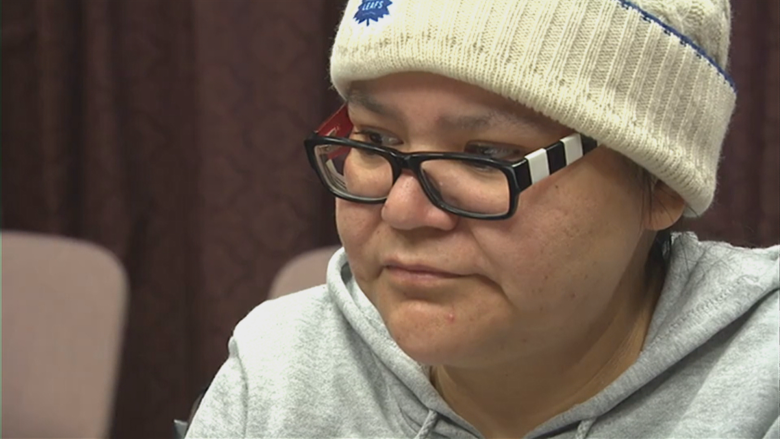Multiple surgeries, infection and a rare disorder: First Nations woman questions her care in Manitoba
When Melodie Harper started to feel pain in her abdomen last December, she never thought it would lead to a year of surgeries, hospital stays and a rare diagnosis.
Now, the 38-year-old mother and wife from Garden Hill First Nation is asking for a review of her care to see if something could have been done differently, preventing similar outcomes for other people.
"I just feel like we could improve the services that are provided for people and I don't want anybody else going through the things that I went through because it is extremely painful," she said at a news conference at the legislature on Monday, accompanied by her husband, Liberal MLA for Kewatinook Judy Klassen, St. Theresa Point First Nation Chief David McDougall, who is also her uncle, and Garden Hill Chief Dino Flett.
"And I've had a lot of bad luck I guess."
Surgeries, infection and a diagnosis
Melodie Harper was Christmas shopping in Winnipeg last year when she was rushed to emergency at St. Boniface Hospital to have her gallbladder removed. She alleges there were complications in the surgery but she was finally released and went home to her remote community, about 470 kilometres northeast of Winnipeg.
It wouldn't be the end of her time in hospital. Since the first visit, she returned to hospital in Winnipeg three more times for another surgery, infection and treatment for pain before finally being diagnosed with the rare disorder gastroparesis.
"I don't even remember the last time I held my wife. Why? The pain that she has, she has a tube sticking out of her belly, an IV most of the time," said her husband, Vernon Harper.
Gastroparesis impacts the movement of muscles in the stomach, preventing it from emptying properly. It interferes with normal digestion, causes nausea and vomiting, abdominal pain and can cause problems with blood sugar levels and nutrition, according to the Mayo Clinic.
The cause is usually unknown. It can be be related to diabetes, which Melodie Harper has, or some people develop it after surgery, if the vagus nerve, which controls stomach muscles, is damaged, according to the Mayo Clinic.
There is no cure.
In January, Melodie Harper was home recovering from her gallbladder surgery but was still feeling intense pain. After a few trips to the local nursing station, she was medivaced back to Winnipeg.
Melodie says there was a gall stone stuck in her bile duct and she had to go in for surgery. Again, she alleges there were complications.
The next month, she was flown back to Winnipeg after there was an infection due to her previous surgeries. In March, she was also hospitalized.
By May, the pain was unbearable, Melodie Harper said. That's when she received the diagnosis of gastroparesis. She's been in Grace Hospital since.
"I have an air mattress inside the hospital that I sleep on. Why? I want to be with her," Vernon Harper said.
Questions around care
Melodie has a tube to get nutrition, but sometimes her body rejects it. She's also in intense pain most of the time throughout her abdomen and up into her chest.
She's not expected to recover and the couple say they've been told to look at palliative care options. They say they don't have information about long-term plans, or even when Melodie can expect to go home.
It's been very hard on the Harpers' six-year-old daughter, the couple said, especially since Melodie was healthy, happy and active just over a year ago.
"How do you tell a child that their mother is dying or their father? There's no really right way of telling a child that," Vernon said.
The Harpers say they've had difficulty accessing Melodie's medical records and have also complained to the Winnipeg Regional Health Authority.
The Harpers allege they faced racism in the health system throughout the province, in particular when it came to Melodie's need for pain medication, and they don't feel the treatment was up to standard.
It's a concern reflected by Klassen and the chiefs, who accompanied the Harpers.
Klassen said First Nations people who use the health care system don't always feel like their concerns are taken seriously or that they get the best care, but they are too worried to speak out because they still need to use the health care system.
"It's really scary to be Indigenous and to need medical help in Manitoba," Klassen said.
In an email to CBC News a spokesperson for Grace Hospital said staff were closely involved with Melodie Harper and her family to provide support and assistance.
"Last week, regional client relations and clinical staff arranged another meeting with Ms. Harper and family, scheduled for this week, including representation from the medicine program, the emergency medicine program, Indigenous Health and other Grace Hospital staff," the statement said.
"Our hearts go out to Ms. Harper and her family. Staff at Grace Hospital have, and will continue to do all they can to provide them with the support they need."
CBC News also reached out to St. Boniface Hospital for comment.



